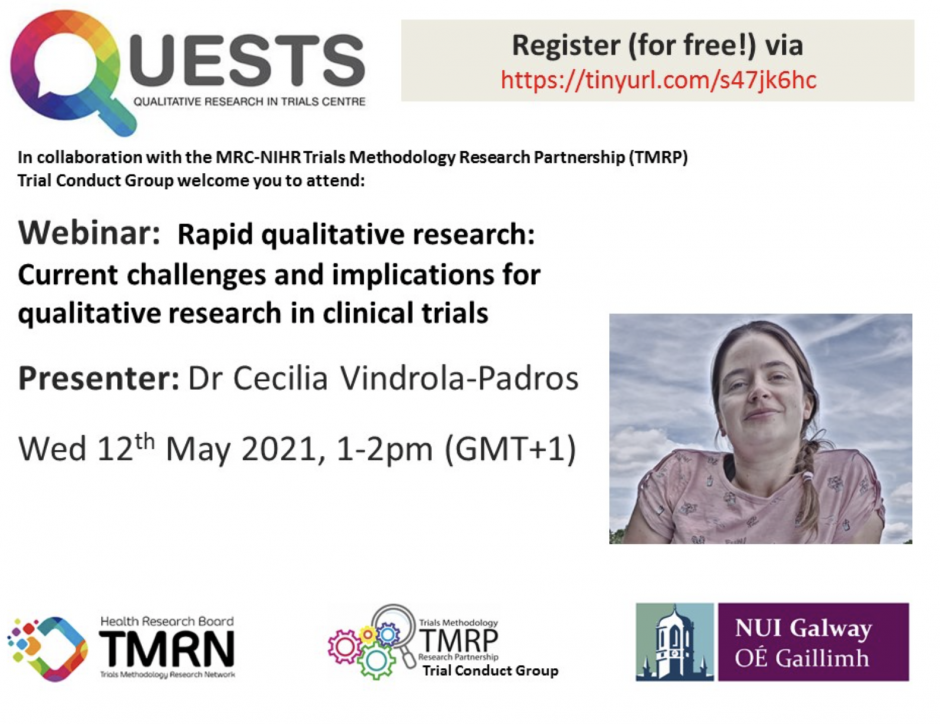Schedule at a glance – all times in Irish Standard Time (IST)
| Time | A | B | C |
| 0845-0855 | Opening Session | ||
| 0900-0955 | UKI-CC-A1 – Women’s Health | UKI-CC-B1 – Methodology 1 | UKI-CC-C1 – Adolescence Experience; Gender Studies |
| 1000-1055 | UKI-CC-A2 – Covid; Public Health; Technology | UKI-CC-B2 Methodology 2 | |
| 1100-1155 | Keynote UKI-KN-A1: Cecilia Vindrola: Rapid Qualitative Research | ||
| noon-1255 | lunch and poster viewing | ||
| 1300-1355 | Workshop UKI-WS-A1: Catherine Houghton, Pauline Meskell and Linda Biesty – Rapid Qualitative Synthesis | Workshop UKI-WS-B1: Shona Hilton – Introduction to media content analysis | Workshop UKI-WS-C1: Chris Patterson – Critical Appraisal of Health Research |
| 1400-1455 | Rapid Qualitative Synthesis continued. | Introduction to media content analysis continued. | Workshop WS-UKI-C2: Hannah Shakespeare – Steps to Publishing |
| 1500-1515 | Closing Session | ||
| Check your local time for the equivalent in your area. Concurrent sessions will have up to 3 papers. | |||
 Keynote
Keynote
1100-1155 IST
Cecilia Vindrola-Padros
Rapid qualitative research in a changing world
The field of rapid qualitative research has a rich history but work still needs to be done to make sure that research can be timely, relevant and responsive. This talk reflects on the lessons learnt from decades of innovation in rapid qualitative research and applies these to the challenges of carrying out qualitative studies under current pressures. It draws from the speaker’s experience of setting up rapid research teams in the UK and abroad and developing a global network of rapid qualitative research teams led by social scientists to explore the experiences of healthcare workers during the COVID-19 pandemic. The talk focuses on the practical and everyday challenges faced by researchers and outlines recommendations for the future development of this field.
Dr Cecilia Vindrola-Padros is a medical anthropologist interested in applied health research and the development of rapid approaches to research. She works across five interdisciplinary teams, applying anthropological theories and methods to study and improve healthcare delivery in the UK and abroad. She has written extensively on the use of rapid qualitative research and currently Co-Directs the Rapid Research Evaluation and Appraisal Lab (RREAL) with Dr Ginger Johnson. Cecilia works as a Senior Research Fellow in the Department of Targeted Intervention, UCL and as a Social Scientist at the NIAA Health Services Research Centre (HSRC), Royal College of Anaesthetists (RCoA). She is the past director of the Qualitative Health Research Network (QHRN) and a Fellow of the Society for Applied Anthropology (SfAA).
Workshops
Click below for the full workshop descriptions in each stream.
Rapid Qualitative Synthesis
1300-1455 IST
Catherine Houghton, Pauline Meskell and Linda Biesty
This workshop will provide an introduction to the methodological considerations when synthesising the evidence in response to questions that require a rapid response. We will use a working example of a review that was published in the Cochrane Library and considered a priority question in response to COVID-19. Attendees should have some prior knowledge of qualitative evidence synthesis (QES) and will have the opportunity to engage in activities in relation to developing and refining the research question and application of framework synthesis in rapid QES.
 |
Dr Linda Biesty is a midwife and qualitative researcher by background and training. Currently a Lecturer in Midwifery at NUI Galway, Linda leads and collaborates on research in pregnancy, childbirth and maternity care and methodological research using qualitative evidence synthesis (QES) and the application of qualitative methodologies to inform trials, trial methodology and core outcome set development. Linda is the co-lead of the QES stream of Evidence Synthesis Ireland (ESI) and a member of the teaching facility of ESI and Cochrane Ireland (facilitating training workshops in QES and Systematic Reviews). She is author on the first ever Cochrane rapid QES. |
 |
Dr Pauline Meskell is a senior lecturer in Nursing & Health Research in the department of Nursing & Midwifery, EHS Faculty at the University of Limerick. Pauline’s research interests lie in the areas of self-management of chronic diseases including renal disease, Ageing, Dementia, outcome measurement, and Evidence Synthesis. Pauline has particular methodological expertise around quantitative and qualitative evidence synthesis, conventional and policy Delphi, instrument development, and outcome measurement. She is currently involved in a number of systematic reviews and qualitative evidence syntheses. Her current research projects include the use of sensory cueing systems in the management of Freezing of Gait (FOG) in Parkinson’s Disease, exploring the experiences of patients transitioning onto dialysis, development of a communication tool to facilitate patient transfer from long stay care to acute care and simulation use in nurse education. |
 |
Dr Catherine Houghton is a senior lecturer in the School of Nursing and Midwifery, National University of Ireland Galway. Catherine’s research interests are primarily around qualitative research methodologies, qualitative evidence synthesis and the integration of qualitative research in trials. Catherine is Co-Chair of the Qualitative Research in Trials Centre: QUESTS (www.quests.ie ) and co-lead of the Qualitative Research in Trials (QRiT) target group, within the MRC-NIHR Trials Methodology Research Partnership(TMRP). Catherine is also a research associate for Evidence Synthesis Ireland, and a member of the Emergency Evidence Response Service (EERS) in response to COVID-19. She has led and co-authored a number of qualitative syntheses including a recently published Cochrane rapid review in response to COVID-19. Catherine is on the advisory board for the International Institute for Qualitative Methodology (IIQM) and European Editor for the International Journal of Qualitative Methods (IJQM). |
Introduction to media content analysis
1300-1455 IST
Shona Hilton
Media images, videos and text are produced daily representing almost every topic of interest to researchers. All of this brings new methodological challenges in how to analyse the content of these communications. Underpinned by traditional media theories and drawing on real world experiences, this workshop examines how the news media and social media shape people's understandings, attitudes and behaviours. This workshop will introduce you to Content Analysis (CA) using a combination of practical sessions and informative slides to take you through the steps involved in setting up and conducting a CA project. The workshop is aimed at researchers, practitioners, PhD students, supervisors who have little or no experience of CA but are looking to research newsprint media and social media, including Youtube videos and images. The workshop draws on the host's own area of expertise in conducting rapid response research into contemporary and high-profile public health issues and is a highly engaging workshop, so come ready to learn and share. The only requirement is an interest in CA.
The workshop will include: An examination of the key theories on the media’s influence on health, including understanding risk, media audiences, media effect and communication theory, and how to set up a CA project.
 |
Prof Shona Hilton is Deputy Director of the MRC/CSO Social and Public Health Sciences Unit, University of Glasgow. She is a Social Scientist, and her research focuses on macro level determinants on health such as mass media and the political and corporate influences that shape public and policy debates. She has published over 100 scientific papers and recently co-edited a book in this field “The media and public health: where next for critical analysis?” Her research largely focuses on contemporary issues facing biomedical, social and public health debates to help improve the timely translation of scientific knowledge into policy and public communications. Often the scientific evidence underpinning such debates is complex and needs to be translated into relatable language for a range of non-expert stakeholders. |
An introduction to critical appraisal of health research for qualitative researchers
1300-1355 IST
Chris Patterson
Rigorous appraisal of the quality and usefulness of research is crucial in making the best decisions for research, policy and practice. This interactive workshop will introduce the concept of critical appraisal and provide practical skills and resources that attendees can apply immediately in their own work. The workshop comprises three parts: 1) understanding what critical appraisal is, why it matters, and what the essential quality criteria are; 2) conducting critical appraisal using an interactive online tool; and 3) learning about different tools and resources to help with critical appraisal. Anyone who wishes to better understand health research is welcome, and no prior experience is necessary. Participants are anticipated to leave the workshop with a better understanding of how to ask - and answer - the right questions about health research. Bringing a laptop or tablet computer may be beneficial, but not essential.
 |
Dr Chris Patterson is a research assistant at the MRC/CSO Social and Public Health Sciences Unit, University of Glasgow. He is a social scientist focused primarily on researching the communication of health issues and polices. Chris developed and maintains Understanding Health Research, a novel online tool funded by Medical Research Council that guides users through the process of reading and appraising health research without the need for prior scientific training or experience. Chris also lectures on critical appraisal of medical research at the University of Glasgow, and promoted a comprehensive approach to critical appraisal that recognises the importance of context and the contextual values of different research methods. |
Steps to Publishing
1400-1455 IST
Hannah Shakespeare
Are you thinking about publishing a book? Do you have questions about how to do that?
Hannah Shakespeare from Routledge would love to talk more with you and see if she can help to answer those queries. Hannah will give a brief overview of the publishing process, her role, and some of her favourite tips about publishing books in qualitative research.
Most of the workshop will be aimed at answering your questions, so do please bring them along! You will have a chance to either type them into the chat, or ask in person. People often ask about things like: how to prepare a book proposal; publishing dissertations; how to find a publisher; Open Access publishing. Any and all reporting of publishing experiences is very welcome too: what you have learned about publishing books, what you enjoyed or went well, anything you’d do differently next time.
Hannah would like to emphasize that all publishing questions are good questions, and she looks forward to talking with you.
 |
Hannah Shakespeare is Senior Editor for Research Methods books at Routledge. She has been in publishing since 2004 and came to methods via (amongst others) anthropology, architecture, political science, and non-fiction books on classic cars and motorcycles. She joined Routledge in early 2016 and publishes books of all types in all areas of methods, with the larger part of her portfolio being in qualitative research. |
Concurrent sessions (AM and PM)
All times listed below are in IST. Click below for the Abstract schedule – abstracts and bios will be available on our Pheedloop event site once opened June 30.
0900-0955 UKI-CC-A1 - Women's Health
Ms. Jackie Fox
Lecturer
National University Of Ireland, Galway
UKI-CC-A1.1 - 'I Loved When We Had Stuff to Do' - Understanding How Change Happened for Women in a Group-Based Programme for Psychological Distress in Primary Care
Dr. Laura Jones
Senior Lecturer In Qualitative And Mixed-methods Applied Health Research
University Of Birmingham
UKI-CC-A1.2 - Exploring the Preferences for Timing of Deinfibulation Surgery and Views on UK National Health Service Female Genital Mutilation Care Provision with Survivors, Male Partners and Healthcare Professionals: The FGM Sister Study
Miss Megan McCarthy
Research Assistant
University College Cork
UKI-CC-A1.3 - Women's Experiences and Perceptions of Anxiety and Stress during the Perinatal Period: A Qualitative Evidence Synthesis
1000-1055 UKI-CC-A2 - COVID-19; Public Health; Technology
Dr. Sue Bellass
Research Fellow
University Of Leeds
UKI-CC-A2.2 - Recruiting Hard-to-Reach Populations During the COVID-19 Pandemic: Experiences from Conducting a Qualitative Study in England with People Who’ve Lived in Prison
Dr. Andrew Darley
Postdoctoral Researcher
University College Dublin
UKI-CC-A2.1 - Exploring the Personal Meaning and Value of ehealth Technology in the Lives of People Living with Colorectal Cancer and Their Family Caregivers Using Interpretive Phenomenological Analysis
Dr. Rebecca Georgis
Senior Lecturer
Bath Spa University
UKI-CC-A2.3 - The Value and Challenges of Empowerment Learning Groups in Qualitative Community-Based Participatory Research with Syrian Refugee Communities
1100-1155 Keynote, see above
1200-1255 Lunch and poster session, see below
1300-1455 Workshops, see above
1500-1505 Closing Message
0900-0955 UKI-CC-B1 - Methodology 1
Dr. Siobhan Mchugh
Research Fellow
Bradford Institute For Health Research
UKI-CC-B1.2 - Evaluation of Video Reflexive Ethnography as a Tool for Improvement in Multi-Disciplinary Maternity Teams
Dr. Charlotte Whiffin
Senior Lecturer
University Of Derby
UKI-CC-B1.1 - A Meta-Synthesis of the Family Experience of Traumatic Brain Injury in Adult Populations: Reflections on a Methodology
Mrs. Caitlin Wilson
Phd Student
University Of Leeds
UKI-CC-B1.3 - Applying Abductive Thematic Network Analysis in Qualitative Health Services Research: A Worked Example of a Prehospital Feedback Interview Study
1000-1055 UKI-CC-B2 - Methodology 2
Miss Bethan Pell
Research Associate
Cardiff University
UKI-CC-B2.3 - Using Visual Timelines in Telephone Interviews with Women Who Have Long-Term Limiting Illnesses
Asst. Prof. Arabella Scantlebury
Assistant Professor
University Of York
UKI-CC-B2.1 - Experiences and Challenges of Conducting and Analysing ‘Big Qualitative Data’: Lessons Learned from a National Mixed Methods Evaluation of General Practitioners Working in or Alongside Emergency Departments
Mrs. Magdalena Wronska
PhD Student
The University of Salford
UKI-CC-B2.2 - Using Participatory Approaches to Design and Implement a Workplace Nutrition Intervention in the UK Construction Industry
1100-1155 Keynote, see above
1200-1255 Lunch and poster session, see below
1300-1455 Workshops, see above
1500-1505 Closing Message
0900-0955 UKI-CC-C1 - Adolescence Experience; Gender Studies
Miss Pearl Lamptey
Phd Student
University of Huddersfield
UKI-CC-C1.2 - “…Because My Body Needs Help Doesn’t Mean My Brain Isn’t All Working, It’s Just My Limbs!” – A Qualitative Study of the Psychosocial Factors That Affect the Health-Related Quality of Life of Young People with Mobility Difficulties in the UK
Ms. Charlotte Nutting
Senior Lecturer In Learning Disability Nursing and Social Work
Sheffield Hallam University
UKI-CC-C1.3 - "It's Just Always Eating": The Experiences of Young People Growing up Medium Chain Acyl-CoA Dehydrogenase Deficiency (Mcadd).
1100-1155 Keynote, see above
1200-1255 Lunch and poster session, see below
1300-1455 Workshops, see above
1500-1505 Closing Message
Poster session – 1200-1255 IST
Click below for the full listing – details to follow by mid-late June.
Upcoming Local Events (UK and Ireland)

Webinar Summary/Outline:
The webinar will include a brief overview of the field of rapid qualitative research, including commonly used approaches, and the benefits and limitations of using rapid qualitative research in healthcare contexts.
Cecilia will draw from examples of recent studies within a trial (SWATs) implemented by the Rapid Research Evaluation and Appraisal Lab (RREAL) to reflect on the methodological approaches that have worked well and future areas of development.
About the presenter:
Cecilia Vindrola-Padros is a medical anthropologist interested in applied health research and the development of rapid approaches to research. She works across five interdisciplinary teams, applying anthropological theories and methods to study and improve healthcare delivery in the UK and abroad. She has written extensively on the use of rapid qualitative research and currently Co-Directs the Rapid Research Evaluation and Appraisal Lab (RREAL) with Dr Ginger Johnson. Cecilia works as a Senior Research Fellow in the Department of Targeted Intervention, UCL and as a Social Scientist at the NIAA Health Services Research Centre (HSRC), Royal College of Anaesthetists (RCoA). She is the past director of the Qualitative Health Research Network (QHRN) and a Fellow of the Society for Applied Anthropology (SfAA).
